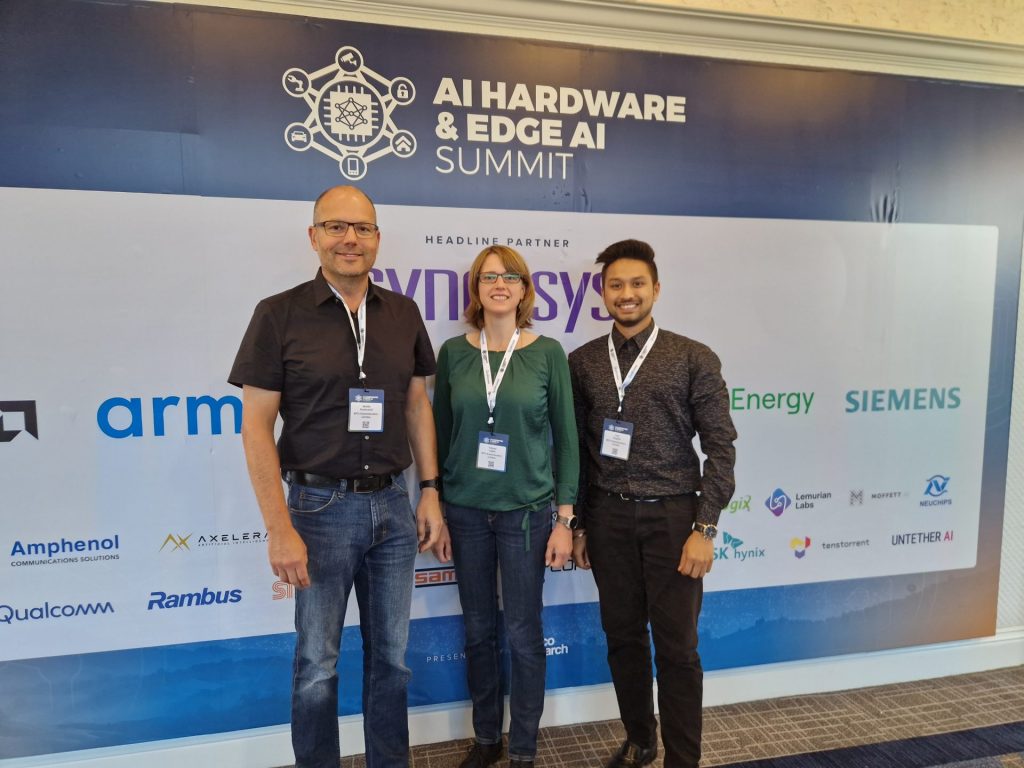SmartFactory-KL Federated AI Use Case presented in Silicon Valley
- Data exchange and data security are not mutually exclusive
- Use Case planned for Hannover Messe 2024
Data is essential when training Artificial Intelligence (AI) programs. Yet, companies are skeptical when it comes to sharing their data. After all, it could provide an interesting advantage to the competition. Federated AI is a Machine Learning approach that does not pass on any sensitive raw data. SmartFactoryKL (SF-KL) and the state university RPTU Kaiserslautern-Landau are collaborating on an actual application. To date, this is a production technology rarely used anywhere in the world, which is why our three experts were invited to present their practical results at the combined AI Hardware & Edge AI Summit held in California.
Kaiserslautern findings in California
The annual AI Hardware & Edge AI Summit focuses on machine learning and the design and deployment of hardware and software in the edge-cloud infrastructure. The Conference agenda includes presentations and expert discussions by the world’s leading researchers. The attendees from Kaiserslautern (KL) were Tatjana Legler, Vinit Hegiste, and Prof. Dr. Martin Ruskowski. Federated AI is a research topic at RPTU with the results being incorporated into the Kaiserslautern Shared Production system. Data rooms and the secure data exchange are essential technologies for smart manufacturing and mandatory for success in the future.
Federated
Data is knowledge. Knowledge can be used or abused. With that in mind, the EU has adopted the GDPR (DSGVO) as a legal basis for handling private data. Nevertheless, many companies have data security concerns and are hesitant to give out any information at all. Edge-cloud platforms enable local, “in-house” training of AI algorithms. However, faster and more effective results would be achieved by machine learning at multiple companies, where the training can benefit all parties. This is now possible using Federated AI. Data is analyzed and evaluated locally in edge devices, then encrypted and sent to the cloud. A central server aggregates the latest mathematical updates from all participating devices and enters them in a global model, which all parties can access. “Such AI procedures can be a real game changer,” said Prof. Martin Ruskowski, CEO of SmartFactoryKL (SF-KL) adding, “We must not allow vague fears to deny us the possibilities of shared data in secure data rooms, otherwise Germany will risk technologically falling behind.”
The Use Case
Surface defects on products are analyzed in the Federated AI use case in KL. It starts with USB sticks in different colors and shapes. “The critical thing,” according to PhD candidate Tatjana Legler, “is that a defect found at our company can be detected at some different location, without it being recognizable on which product the defect was originally detected.” Example: KL quality control detects a rust spot on the metal plug and mathematically feeds it into the global defect pool. There is no information about the company of origin, the location, or the product itself. It is not even apparent that the defect is a rust spot. This basic principle is already in practical use for AI-assisted training of quality controls at the KL Shared Production system. As an example, the production of individual components for a model truck is contracted nationwide. The suppliers train their AI applications locally with defects such as scratches, stains, unsightly edges, wrong colors, etc. Their findings help to improve the central algorithm, which in turn can be used by everyone. In this way, AI contributes to sustainability: It helps to reduce waste and costs. The Federated AI use case will be presented for the first time at Hannover Messe 2024.

